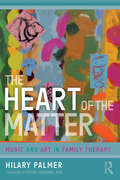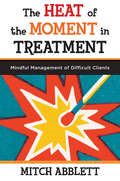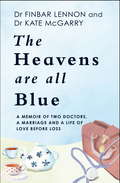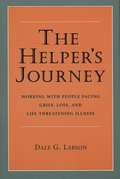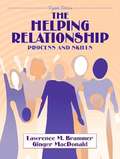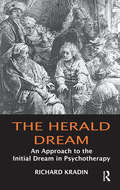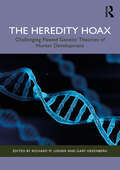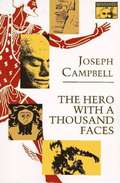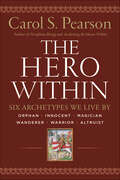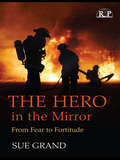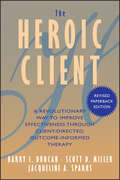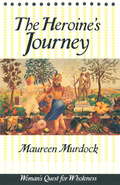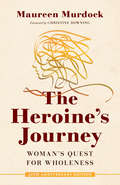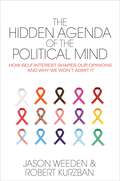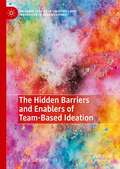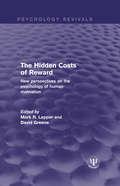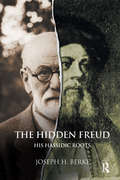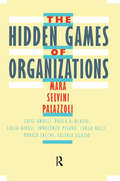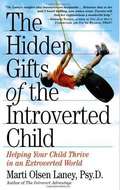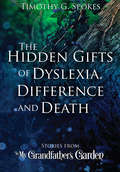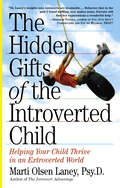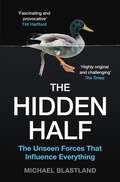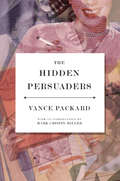- Table View
- List View
The Heart of the Matter: Music and Art in Family Therapy
by Hilary PalmerThe Heart of the Matter invites therapists from all disciplines to consider the use of music and art in their work with families. It introduces systemic music and art ideas, giving clinical examples from practice, and a rationale for using each technique. Conversations with therapists who have explored and incorporated the techniques into their work are shared, and include both personal and professional responses to incorporating new methods in practice. Through a back drop of exploration into what creativity is, the history of the arts in therapy, and consideration of what happens when we use words, the case for music and art to be part of practice with families is presented. This book is more than a handbook of techniques; it explores who we are as therapists, our challenges and our resourcefulness, as we operate in multiple systems to bring about positive change.
The Heat of the Moment in Treatment: Mindful Management of Difficult Clients
by Mitch AbblettHow to warm up to the clients that stop you cold. Have you experienced the anger, fear, doubt, and frustration that most clinicians feel but rarely put words to? Have you ever overreacted to a client in session or found yourself overwhelmed by the work with that client in your caseload? Are you looking for tools to manage your most "difficult" clients? Chances are, you're like all other clinicians: At times you play "tug-of-war" with those in your care. The Heat of the Moment in Treatment is for clinicians looking to explore, reassess, and transform the way they treat their most difficult clients. With carefully designed mindfulness-based exercises, self-assessments, and skill development activities, this workbook helps clinicians understand their own role in therapeutic interactions, as well as how to proactively respond to tough client behavior in ways that improve the prospects for successful treatment. Author Mitch Abblett acts as a sensitive, expert guide, laying out a roadmap for the toughest of clinical encounters that almost all therapists face, whether seasoned or just starting out. His use of relatable metaphors, rhetorical questions, and stories from his own experience allows readers to reflect upon their own psychotherapy practice without feeling like there is one right way to deal with challenging clients. The Heat of the Moment in Treatment will help clinicians move beyond assumptions and reactive impulses to their "difficult" clients. Readers will gain proactive clinical leadership skills, while learning how to expand mindful awareness of self and others to access compassion and empathy for any client--even when the "heat" of moment-to-moment interaction in session is hard to tolerate.
The Heavens Are All Blue: A memoir of two doctors, a marriage and a life of love before loss
by Dr Finbar Lennon Dr Kathleen McGarryWhen Dr Kate McGarry was diagnosed with an advanced cancer of unknown origin she resolved to write a book to chart her experience: as a woman coming to terms with such devastating news and what this meant to her as a wife and a mother but also, crucially, how she experienced cancer and its treatment as a doctor, who had become a patient. As Kate adjusted to living with cancer and underwent treatment, she enlisted the help of her husband, fellow doctor, Finbar to help her write the book but then she sadly passed away on the 5 January 2018. With no writing experience, and wrestling with his own heartache, Finbar set about finishing their story. The result is a touchingly beautiful memoir about love, grief and togetherness.'A loving memoir of time spent both together and apart ... [Kate's] personal legacy, as a mother, a wife and the life and soul of the party, is recorded beautifully in this moving memoir' Sunday Business Post
The Heavens Are All Blue: A memoir of two doctors, a marriage and a life of love before loss
by Dr Finbar Lennon Dr Kathleen McGarryWhen Dr Kate McGarry was diagnosed with an advanced cancer of unknown origin she resolved to write a book to chart her experience: as a woman coming to terms with such devastating news and what this meant to her as a wife and a mother but also, crucially, how she experienced cancer and its treatment as a doctor, who had become a patient. As Kate adjusted to living with cancer and underwent treatment, she enlisted the help of her husband, fellow doctor, Finbar to help her write the book but then she sadly passed away on the 5 January 2018. With no writing experience, and wrestling with his own heartache, Finbar set about finishing their story. The result is a touchingly beautiful memoir about love, grief and togetherness.'A loving memoir of time spent both together and apart ... [Kate's] personal legacy, as a mother, a wife and the life and soul of the party, is recorded beautifully in this moving memoir' Sunday Business Post
The Helper's Journey: Working With People Facing Grief, Loss, And Life Threatening Illness
by Dale G. LarsonThis groundbreaking work, written for both professionals and volunteers, combines an inspiring view of helpers and helping with a focus on meeting the personal, interpersonal, and team challenges of caring for people facing grief, loss, and life-threatening illness.
The Helping Relationship: Process and Skills
by Lawrence M. Brammer Ginger MacdonaldThe Helping Relationshipis a book for learning and teaching basic philosophy, helping skills, and processes that are essential grounding for most professions and for all human-contact occupations. The Helping Relationship presents and illustrates skills in the order in which they are used in the helping process. The primary emphasis in the helping process is to promote self-help, such as coping competence, to solve one's own problems and draw on one's own inner strengths. For social workers, counselors, business managers, nurses and anyone involved in the helping professions.
The Herald Dream: An Approach to the Initial Dream in Psychotherapy
by Richard KradinThis monograph focuses on a systemic approach to dream interpretation and the unique importance of the initial dream. The first dream reported in a psychoanalytic therapy session poignantly encapsulates the major issues that the patient brings to the treatment. These dreams 'herald' the trajectory of the treatment and can be interpreted in the service of psychodynamic diagnosis and prognosis.The book melds aspects of Jungian dream analysis, with neo-Freudian analytic thought, current neurobiological concepts, and Buddhist psychology, to yield a rich and powerful understanding of how dreams symbolize the multifaceted aspects of the psyche. Multiple examples of initial dreams are discussed in detail, with suggestions for how they can inform the analytic stance and serve as objects for analysis over the course of a treatment.
The Heredity Hoax: Challenging Flawed Genetic Theories of Human Development
by Richard M. Lerner Gary GreenbergThis innovative and thought-provoking book integrates both new, authored material and reprints of existing literature that, together, provide a compelling narrative that reveals the fatally flawed science associated with genetic reductionist accounts of human behavior and development.Through an interdisciplinary lens, it illuminates the dynamic nature of human development, empowering readers to question established notions, and embrace the complexity of our potential. Across the book, the work of top-tier scientists, from developmental, comparative, educational, and biological science illuminates theory and research converging on the conclusion that the multiple egregiously flawed work of genetic reductionists should be expunged from research pertinent to human development. The book challenges the prevailing reductionist narratives and their application to social policies, programs, and uses in media. Theoretically based and empirically rigorous, this multidisciplinary approach to human development will shine a light on the inequities in individuals or groups that suggest that specific genes do not enable them to succeed in life.The Heredity Hoax invites graduate programs and advanced undergraduate courses on human development, human potential, epigenetics, and more to delve into the intricate interplay between genes, environment, and personal growth. This will also serve as an unimpeachable source of evidence for researchers, educators, and social policymakers.
The Hero With a Thousand Faces
by Joseph CampbellThe first popular work to combine the spiritual and psychological insights of modern psychoanalysis with the archetypes of world mythology, the book creates a roadmap for navigating the frustrating path of contemporary life.
The Hero Within: Six Archetypes We Live By
by Carol S. PearsonThe Classic Guide, Updated for Our Contemporary WorldA modern classic of Jungian psychology, The Hero Within has helped hundreds of thousands of people enrich their lives by revealing how to tap the power of the archetypes that exist within. Drawing from literature, anthropology, and psychology, author Carol S. Pearson clearly defines six heroic archetypes—the Innocent, the Orphan, the Wanderer, the Warrior, the Altruist, and the Magician—and shows how we can use these powerful guides to discover our own hidden gifts, solve difficult problems, and transform our lives with rich sources of inner strength.This book will speak deeply to the evolving hero in all of us and reverberate through every part of our lives. With poignant wisdom and prolific examples, it gives us enduring tools to help us develop our own innate heroic gifts—the Orphan's resilience, the Wanderer's independence, the Warrior's courage, the Altruist's compassion, the Innocent's faith, and the Magician's abiding power.
The Hero in the Mirror: From Fear to Fortitude (Relational Perspectives Book Series)
by Sue GrandIn times of stress, trauma and crisis—whether on a personal or global scale—it can be all too easy for us to externalize a larger-than-life figure who can assuage our suffering, a Hero who comes to the fore even as we recede into the background. In taking on our collective burden, however, such an omnipotent Hero can actually undermine us, representing as it does the very same characteristics we fail to note in one another. By granting the Hero to power to set things right, we seem to deny it to ourselves, leaving us temporarily lightened but ultimately helpless. In response, Sue Grand deconstructs the myth of the Heroic and argues for the "ordinary hero," a more realistic figure with the same limitations, concerns and fears as the rest of us, but who nonetheless stands up for the greater good in the face of danger, despair and villainy. From the foundation of relational psychoanalysis, Grand incorporates cultural and ethical considerations in her examination of what this ordinary hero might look like, a trip that takes us from the consulting room to right outside our front doors, from the heart of a "civilized" nation to the myriad war-torn regions dappling the globe, both past and present. Along the way we meet individuals whose encounters with adversity range from the mundane to the catastrophic, and learn how they struggle against the dubious concept of the Hero looming large in their lives. Recounting this journey in finely-tuned yet imminently accessible and enjoyable prose, Grand demonstrates that the best place to ultimately find the ordinary hero is within each other: The hero is us.
The Heroic Client
by Jacqueline A. Sparks Barry L. Duncan Scott D. MillerIn this controversial book, psychologists Barry Duncan and Scott Miller, cofounders of the Institute for the Study of Therapeutic Change, challenge the traditional focus on diagnosis, "silver bullet" techniques, and magic pills, exposing them as empirically bankrupt practices that only diminish the role of clients and hasten therapy's extinction. Instead, they advocate for the long-ignored but most crucial factor in therapeutic success-the innate resources of the client. Based on extensive clinical research and case studies, The Heroic Client not only shows how to harness the client's powers of regeneration to make therapy effective, but also how to enlist the client as a partner to make therapy accountable. The Heroic Client inspires therapists to boldly rewrite the drama of therapy, recast clients in their rightful role as heroes and heroines of the therapeutic stage, and legitimize their services to third-party payers without the compromises of the medical model.
The Heroine's Journey
by Maureen MurdockThis book describes contemporary woman's search for wholeness in a society in which she has been defined according to masculine values. Drawing upon cultural myths and fairy tales, ancient symbols and goddesses, and the dreams of contemporary women, Murdock illustrates the need for--and the reality of--feminine values in Western culture today.
The Heroine's Journey: Woman's Quest for Wholeness
by Maureen MurdockThis book describes contemporary woman's search for wholeness in a society in which she has been defined according to masculine values. Drawing upon cultural myths and fairy tales, ancient symbols and goddesses, and the dreams of contemporary women, Murdock illustrates the need for—and the reality of—feminine values in Western culture today.
The Hidden Agenda of the Political Mind: How Self-Interest Shapes Our Opinions and Why We Won't Admit It
by Robert Kurzban Jason WeedenWhy your political views are more self-serving than you thinkWhen it comes to politics, we often perceive our own beliefs as fair and socially beneficial, while seeing opposing views as merely self-serving. But in fact most political views are governed by self-interest, even if we usually don't realize it. Challenging our fiercely held notions about what motivates us politically, this book explores how self-interest divides the public on a host of hot-button issues, from abortion and the legalization of marijuana to same-sex marriage, immigration, affirmative action, and income redistribution.Expanding the notion of interests beyond simple economics, Jason Weeden and Robert Kurzban look at how people's interests clash when it comes to their sex lives, social status, family, and friends. Drawing on a wealth of data, they demonstrate how different groups form distinctive bundles of political positions that often stray far from what we typically think of as liberal or conservative. They show how we engage in unconscious rationalization to justify our political positions, portraying our own views as wise, benevolent, and principled while casting our opponents' views as thoughtless and greedy.While many books on politics seek to provide partisans with new ways to feel good about their own side, The Hidden Agenda of the Political Mind illuminates the hidden drivers of our politics, even if it's a picture neither side will find flattering.
The Hidden Barriers and Enablers of Team-Based Ideation (Palgrave Studies in Creativity and Innovation in Organizations)
by Linda Suzanne FolkThis book explores elements of team dynamics and interactions that block or enable effective ideation. The author investigates interpersonal dynamics, inhibitors of collaboration and boosters of ideation efficiency that govern the ability of a team to generate new and valuable ideas.Where it is widely accepted that teams are a necessity in the creative process, this book highlights the inconsistency in terms of quality and reliability of creative output when looking at teams. Why do some teams struggle, and others succeed in innovating? This book offers a valuable resource for those interested in the qualities and interventions that can impact the ideation potential of a team.
The Hidden Costs of Reward: New Perspectives on the Psychology of Human Motivation (Psychology Revivals)
by David Greene Mark R. LepperOriginally published in 1978, this volume provided a broad survey of the latest research and theory, at the time, concerning the potential detrimental effects of inappropriate uses of tangible rewards to modify behaviour. Overall, this research questions the dominant paradigm within which reinforcers, by definition, have positive effects on performance and subsequent behaviour, and suggests new directions for the study of human motivation. In a series of five original integrative essays, the contributors summarize their own and related research programmes. These theoretical essays are complemented by two introductory chapters, that provide a historical context for this research, and four discussion chapters, that speak to broader issues, including both the implications and limitations of the research presented. At the time, this was the latest information on a most provocative area.
The Hidden Freud: His Hassidic Roots
by Joseph H. BerkeThis book explores Sigmund Freud and his Jewish roots and demonstrates the input of the Jewish mystical tradition into Western culture via psychoanalysis. It shows in particular how the ideas of Kabbalah and Hassidism have profoundly influenced and enriched our understanding of mental processes and clinical practices. Freud's own ancestors were hassidim going back many generations, and the book examines how this background influenced both his life and his work. It also shows how he struggled to deny these roots in order to be accepted as a secular, German professional, and at the same time how he used them in the development of his ideas about dreaming, sexuality, depression and mental structures as well as healing practices. The book argues that in many important respects psychoanalysis can be seen as a secular extension of Kabbalah. The author shows, for example, how Freud utilized the Jewish mystical tradition to develop a science of subjectivity.
The Hidden Games of Organizations
by Carlo Ricci Valeria Ugazio Mara Selvini Palazzoli Luigi Anolli Paola Di Blasio Lucia Giossi Innocenzo Pisano Marica SacchiThis book describes conflicts inside four organizations: a corporation, a hospital unit, a training institute, and a school. It explains what solutions were recommended and stresses the importance of communication to create good working conditions in the organizations.
The Hidden Gifts Of The Introverted Child: Helping Your Child Thrive In An Extroverted World
by Marti Olsen LaneyIntroverted children are often misunderstood, even by their parents, who worry about them. Engaged by their interior world, they're often regarded as aloof. Easily overwhelmed by too much stimulation, they can be seen as unmotivated. Content with just one or two close friends, they may be perceived as unpopular. Parents fret that they are unhappy and maladjusted. But the truth is quite different: Introverted children are creative problem solvers. Introverted children love to learn. Introverted children have a high EQ (emotional IQ) and are in touch with their feelings. They take time to stop and smell the roses, and they enjoy their own company. They are dependable, persistent, flexible, and lack vanity. How can parents help their introverted children discover and cultivate these wonderful gifts? Help is here. Written by Dr. Marti Olsen Laney, author of The Introvert Advantage with 74,000 copies in print, The Hidden Gifts of the Introverted Child fully explains introversion as a hardwired temperament, not a disability, and tells just what parents need to do to help their child become the person he or she is meant to be--and succeed in an extroverted world. Beginning with a 30-question quiz that places a child on the introvert/extrovert continuum, The Hidden Gifts shows parents how to foster a climate that allows introverted kids to discover their inner strengths; schedule ways for a very young innie to recharge those batteries and teach an older child to do it for him- or herself; create a harmonious household with siblings, and parents, of different temperaments; help innies find success at school, sports, parties, and other group activities.
The Hidden Gifts of Dyslexia, Difference and Death: Stories from - In My Grandfather's Garden
by Timothy G SpokesCan your difficulties become stepping-stones to a successful future? Can a young boy overcome a serious reading difficulty and achieve beyond all expectations?For a few gruelling years in a Catholic boys’ school, where the Brothers carry a lash under their gowns ready to strike any boy who offends their strict code, Tim struggles with maths and English, and keeps mostly to himself. But he has an observant inner life, with hours spent wandering in the cemetery his grandfather tends, learning about death the leveller and the falsity of social class and wealth.Tim has pitch perfect hearing and a voice like an angel, and is marked out by the Principal Brother to become a priest. Not him! Suffering the tragedy of losing the only three close friends he makes over the years, he experiences living with dyslexia as a cross to bear, until he finds the key to a fearless destiny as a paramedic, trauma and emergency nurse, and academic.The gift of dyslexia has taught Tim to say, “Don’t reach for the sky—hell! Go for the stars. You really can do anything you want.” Wisdom, he says, is found in the strangest places.Among these pages you will experience what Tim learnt within his grandfather’s garden, a strange place to find wisdom—among the head stones and monuments, and where, he says, you can find yesterday’s people.
The Hidden Gifts of the Introverted Child: Helping Your Child Thrive in an Extroverted World
by Marti Olsen Laney Psy.D.Introverted children are often misunderstood, even by their parents, who worry about them. Engaged by their interior world, they’re often regarded as aloof. Easily overwhelmed by too much stimulation, they can be seen as unmotivated. Content with just one or two close friends, they may be perceived as unpopular. Parents fret that they are unhappy and maladjusted. <P><P>But the truth is quite different: Introverted children are creative problem solvers. Introverted children love to learn. Introverted children have a high EQ (emotional IQ) and are in touch with their feelings. They take time to stop and smell the roses, and they enjoy their own company. They are dependable, persistent, flexible, and lack vanity. How can parents help their introverted children discover and cultivate these wonderful gifts? Help is here. Written by Dr. Marti Olsen Laney, author of The Introvert Advantage with 74,000 copies in print, The Hidden Gifts of the Introverted Child fully explains introversion as a hardwired temperament, not a disability, and tells just what parents need to do to help their child become the person he or she is meant to be—and succeed in an extroverted world. <P>Beginning with a 30-question quiz that places a child on the introvert/extrovert continuum, The Hidden Gifts shows parents how to foster a climate that allows introverted kids to discover their inner strengths; schedule ways for a very young innie to recharge those batteries and teach an older child to do it for him- or herself; create a harmonious household with siblings, and parents, of different temperaments; help innies find success at school, sports, parties, and other group activities.
The Hidden Half: The Unseen Forces that Influence Everything
by Michael BlastlandWhy does one smoker die of lung cancer but another live to 100? The answer is "The Hidden Half"—those random, unknowable variables that mess up our attempts to comprehend the world. We humans are very clever creatures—but we're idiots about how clever we really are. This entertaining and ingenious book reveals how in our quest to make the world more understandable, we lose sight of how unexplainable it often is. The result, from GDP figures to medicine, is that experts know a lot less than they think. Filled with compelling stories from economics, genetics, business, and science, The Hidden Half is a warning that an explanation which works in one arena may not work in another. Entertaining and provocative, it will change how you view the world.
The Hidden Mind: Psychology, Psychotherapy, and Unconscious Processes
by Israel OrbachAn examination of the various models of the unconscious used in the various psychological schools of thought.
The Hidden Persuaders
by Mark Crispin Miller Vance Packard"One of the best books around for demystifying the deliberately mysterious arts of advertising."--Salon"Fascinating, entertaining and thought-stimulating."--The New York Times Book Review"A brisk, authoritative and frightening report on how manufacturers, fundraisers and politicians are attempting to turn the American mind into a kind of catatonic dough that will buy, give or vote at their command--The New YorkerOriginally published in 1957 and now back in print to celebrate its fiftieth anniversary, The Hidden Persuaders is Vance Packard's pioneering and prescient work revealing how advertisers use psychological methods to tap into our unconscious desires in order to "persuade" us to buy the products they are selling.A classic examination of how our thoughts and feelings are manipulated by business, media and politicians, The Hidden Persuaders was the first book to expose the hidden world of "motivation research," the psychological technique that advertisers use to probe our minds in order to control our actions as consumers. Through analysis of products, political campaigns and television programs of the 1950s, Packard shows how the insidious manipulation practices that have come to dominate today's corporate-driven world began. Featuring an introduction by Mark Crispin Miller, The Hidden Persuaders has sold over one million copies, and forever changed the way we look at the world of advertising.Vance Packard (1914-1996) was an American journalist, social critic, and best-selling author. Among his other books were The Status Seekers, which described American social stratification and behavior, The Waste Makers, which criticizes planned obsolescence, and The Naked Society, about the threats to privacy posed by new technologies.
